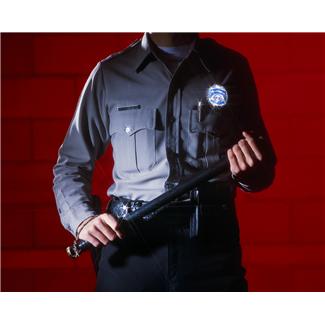Living in a police state — Communist Czechoslovakia had nothing on modern Wisconsin
One of the scarier moments in my life occurred back in 1987, when I was traveling with my mother in still-Communist Prague. We’d originally planned to stay there six days, but a three-day taste of Communism — the shabbiness, the sullen people, the dirty air, the vile food — was all we could stand. We studied our map carefully, tried to make sense of the completely foreign street names, jumped in our car, and headed for Brno, on the road to Vienna.
Or at least, that was the plan. What actually happened was that we got hopelessly lost on Prague’s confusing network of streets. And once lost, we couldn’t reorient ourselves, ’cause we couldn’t make sense of those darn Czech street names.
Eventually, we realized that we were making a vast circle, over and over. Mom finally had it. “We’re going south,” she said, making a hard left onto a vast, empty street. That was a mistake. We ended up on a big plaza, deserted except for one small Lada parked on the far right side of the plaza. This did not look right.
Things looked even less right when the Lada suddenly emitted a siren-like sound, blue lights flashed, and it accelerated towards us. Mom pulled over. The Lada pulled over behind us. The doors opened and, out of this teeny car stepped two of the tallest, skinniest police officers I’ve ever seen. Their combined age couldn’t have been much more than 40. One came to the driver’s window, and one to the passenger’s.
Mom tried German. Nothing.
Mom and I tried English. Nothing.
Well, maybe something. The police officer next to my Mom stuck out his hand, the one that wasn’t near his gun, and said “Passports.”
Gulp.
We gave him the passports.
And that was one of the most helpless feelings in my life. There we were, in a Communist country, on a deserted street, sans passports, with two very young, armed Communist police officers staring down at us.
Mom and I did what we do best. We fluttered. We flapped our hands. We practically clucked. We were both small and blonde. We radiated harmlessness. And we kept saying, “Brno. Brno. Brno.”
The officers conferred with each other in rapid Czech. They came to a decision.
Suddenly, we had our passports back. The officers got into their little car and signaled that we should follow them. And within about five minutes, they had us on the road to Brno, bless their hearts. Mom and I were kvelling with delight. We also realized how lucky we were, and how badly it could have turned out for us, violating some unknown law and finding ourselves in the hands of an unlimited police bureaucracy.
Maybe that’s why David Willoughby’s story resonated so strongly with me. David is the U.S. Marine Vet who was arrested when he held up a protest sign in Wisconsin. Here’s how David describes his experience:
My name is Dave Willoughby. I am the one in the video.
Without being told what I had done, I was handcuffed and escorted off premise. Placed in a squad car and taken to a police station. I asked if I should have my rights read to me and was told “You’re not being arrested.” My personal property was taken from me, I was fingerprinted, mug shot taken and locked in a dark jail cell (lights off) still handcuffed.
I sat in that jail cell, looking out of a meshed wire window, at a large American flag flying in the background. Where am I? How can this be happening? What did I do wrong? I prayed for strength.
When I swore the oath to protect and defend the Constitution, I never realized until recently, how vulnerable our precious freedoms actually are.
I did nothing wrong. There were literally hundreds of cameras at this event. I challenge all media to find one shred of evidence, which would support the actions of the Milwaukee PD officers.
Think about that: my Mom and I, in a Communist state, where we didn’t speak the language, fared better than an American veteran on American soil. That he spoke the language made no difference:
As I was walking, I felt this arm grab me and I felt this fist and I turned around and it was a cop! He told me ‘You’re gonna get your ass kicked.’ All the while I was asking the police officer if he was going to uphold his oath to protect and defend the Constitution? He never answered me.” “The whole time I’m asking ‘What did I do wrong?’ No answer. They handcuffed me. They took me into a car. I asked ‘Am I being arrested?’ and they said ‘No, you’re not being arrested.’ But they handcuffed me, and put me in a dark jail cell, all the while not arresting me.”
Americans always feel “It can’t happen here.” But it can. It routinely happened to blacks in the Jim Crow South, and now it apparently happens to foes of public sector unions (unions that include police officers) in the American North/Midwest. Even if this was anomalous, we must take it seriously. If we don’t, it creates a precedent.
I have the highest regard for police officers. They’re doing a sometimes dangerous job and an often frustrating one. Every interaction I’ve ever had with a police officer has seen the officer being professional, polite and, usually, quite pleasant. Nevertheless, police officers have a lot of power and, for some, power corrupts. The way to keep that thin blue line entirely honest is to let the police know that, even though we respect them and their service, we’re also watching them, as citizens of a free state can and should do.

